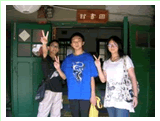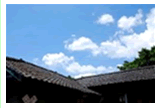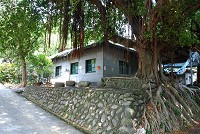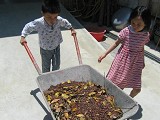2. What courses do your child take?
3. After the course, what are the changes you can find from your child?
4. Except for general course, what else is more special?
5. What are the ages ranging from?
6. What are the future expectatoins?
1. What’s the reason that you think it can draw your kids to learn in the place?
Pi Chi: The trees, the birds, and the natural resourses. Won’t you be attrated to it? Of course! With these nature landscape and these sincere volunteer workers, everyone likes it here. When you are outside, you’re not going to get along with these enthusiastsic volunteer workers so quickly.《Top》
2. What courses do your child take?
Pi Chi: Every one of it. Since last year, we took the summer camp course, until now, we’re quite familiar with it, just like it’s been ten years. We hope you can join us more often. Sometimes, I came here and walk on the trail just for a walk, to know some plants, or to know some elder people. Ahh…I know it….why do I feel like I’ve been here for a decade, because when we’re talking they shared a lot of stuff with me.《Top》
3. After the course, what are the changes you can find from your child?
Pi Chi: Through the interaction with students can we understand the difference that has been made. It’s pretty obvious that ususally there are lots of gradings or report sheets about students’ performance. I’m sure you all know that in the process of learning. For example, a kid of my friend loved sports a lot. He learned swimming and then went for all kinds of competitions. After he got hurt, he suddenly hated swimmimng. This is awful.
My kid always tell me, “mom, we’re so lucky.” These volunteer workers not only teach the kids what they’ve got, they also learned something more than the talents. Therefore, the kids learned about the nature, and the land.
《Top》
4. Except for general course, what else is more special?
Pi Chi: The pastry class is really special. It’s a local and traditional way of baking dirt into an art. First, you pick up the dirt from the land. Then you put them together, layer by layer. It’s really difficult to keep it not falling off. Hope you can explore the fun by yourselves.
In addition, the MOGGY Team is special,too. The MOGGY is composed of students from the community school. We do some sweeping and mopping stuff every Saturday. Sometimes, we talk to the patients or massage for them. It’s all about “giving”, not just “taking” from others.
《Top》
5. What are the ages ranging from?
Pi Chi: From first year to the sixth year. Junior high students have heavy academic pressure and less interaction with parents, so it’s probably not possible to be here. If possible, I certainly hope more juvinile can join the programs here. Sometimes, just to walk around, to eat breakfast, to watch the trees, or listen to the birds sing….These stuff seems to vanish some time ago, but it is actually around you. With these volunteer workers, this place has been organized. Hope more and more people can utilize these resources and try to be their friends.《Top》
6. What are the future expectatoins?
Pi Chi: As a mother, the word “expectation” seems to demand something from poeple. Because of the unselfish devotion of these volunteer workers, I’m rather touched than asking something from them.《Top》











